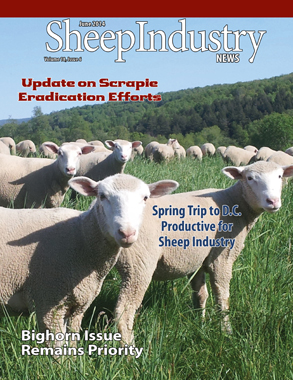
- June 2014
- President’s Notes
- Market Report
- Scrapie Eradication Remains Goal, but APHIS Hesitant About Timeline
- ASI Hosts Productivity Improvement Committee
- ASI’s 150th Blankets and Pillows Available Soon
- News Briefs
- Spring Trip to Nation’s Capital Called ‘Quite Productive’ for Sheep Industry
- Krebs Reminds Agency of NEPA Regulations in Bighorn Issue
- Superior Breaks Ground on New Facility
- Bighorn “Viability” Regulations Threaten Domestic Industry
- Running Rancher: Ken Wixom Brings Endurance to ASI’s Executive Board
- Study: Grouse Doing Well on Grazed Lands
- ‘Connect to Consumers’ Stressed During IWTO Congress
- Center of Nation Sale Features NSIP Sheep
- Obituaries
Krebs Reminds Agency of NEPA Regulations in Bighorn Issue
JUDY MALONE
ASI Director of Industry Information
June 2014
In a letter to USDA’s Agricultural Research Service (ARS) and the U.S. Forest Service (FS), ASI President Clint Krebs emphasized the importance of the agency’s obligations under the National Environmental Policy Act (NEPA) to actively consult each other on issues affecting domestic sheep and bighorn sheep.
Krebs wrote, “Your USDA agencies have been extensively involved in these sheep issues. The FS is the land manager for significant portions of the western United States where a potential for interaction between the two species is possible and, as such, has made decisions to close domestic sheep grazing allotments on the assumption that domestic sheep are responsible for the decline in certain populations of bighorn sheep due to disease transmission. ARS has simultaneously been engaged in significant and lengthy research on the science behind the theory of disease transmission in the wild.
Krebs noted that the statute and the regulations are clear: after preparing a draft Environmental Impact Statement (EIS) and before preparing a final EIS, the FS must “obtain the comments of any federal agency which has special expertise with respect to any environmental impact involved.” When the FS makes decisions on issues impacting bighorn sheep and domestic sheep, it cannot fulfill its NEPA obligations without actively soliciting the involvement of ARS before the final EIS and Record of Decision are issued. Simultaneously, ARS has a duty to comment on draft EISs within its expertise. Those comments must be as specific as possible and may address both the adequacy of a draft EIS or the merits of alternatives or both. The FS then has a duty to assess and consider those comments and respond to them including possibly modifying its alternatives, developing and evaluating alternatives, supplementing, improving or modifying analysis, making factual corrections, or explaining why, if appropriate, the ARS comments do not warrant any further agency response.
“If the FS and ARS will follow these legal requirements in the development of agency actions related to domestic sheep and bighorn sheep, then ASI will be assured that the two agencies benefit from each other’s perspectives, which is absolutely essential to proper management decisions related to the issues. Failure to follow these statutory and regulatory requirements would cause ASI to reach the opposite conclusion that the analysis and decision are legally flawed and very likely factually and scientifically flawed due to the failure to obtain the necessary comments and analyze them under the regulations,” Krebs concluded.

